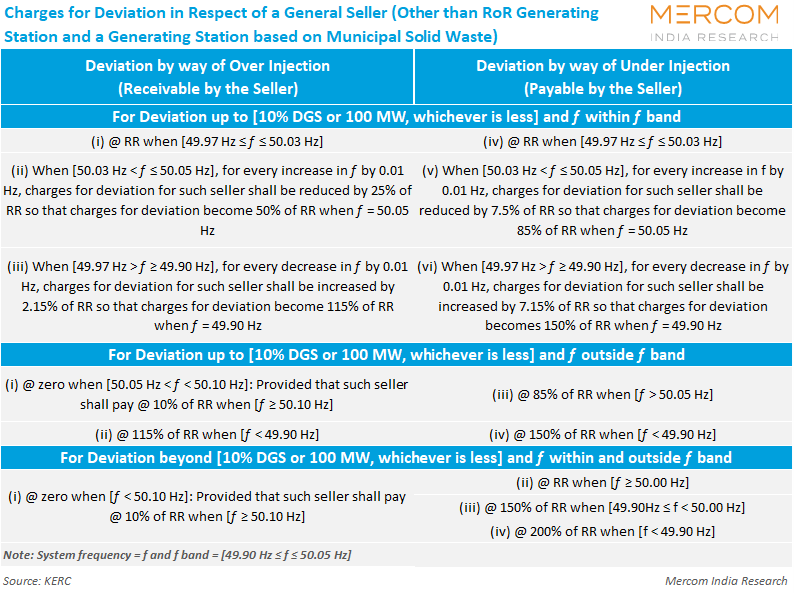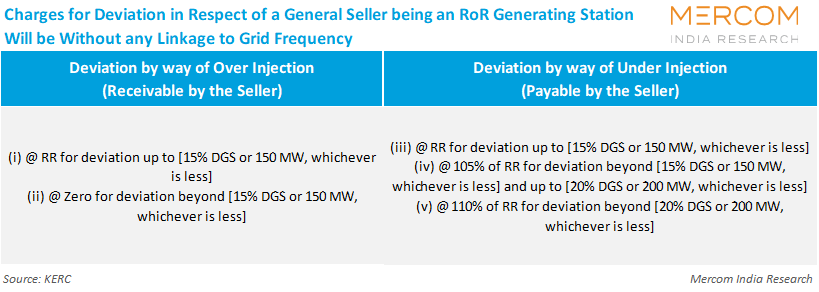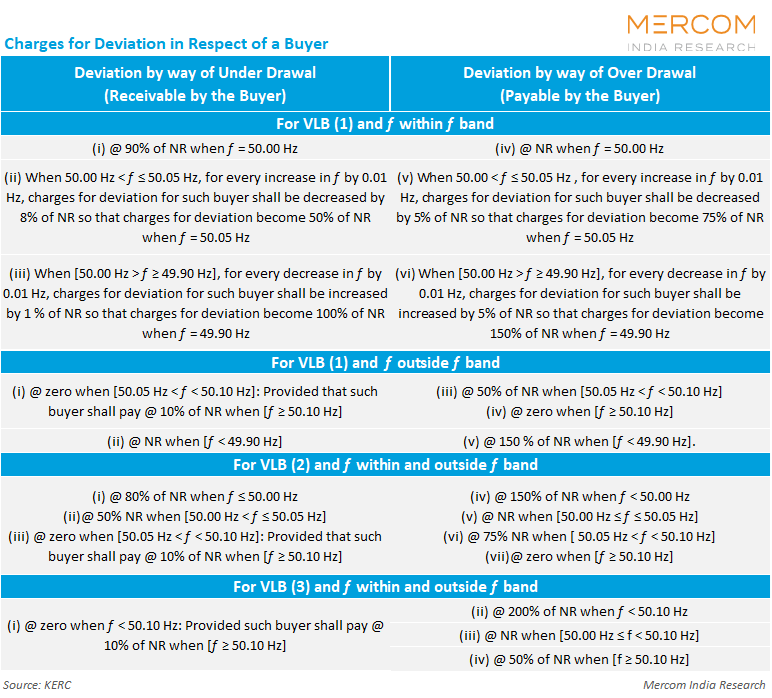Karnataka Introduces Deviation Mechanism for Unscheduled Power Usage
The State Load Dispatch Center will manage deviations
October 4, 2024
Follow Mercom India on WhatsApp for exclusive updates on clean energy news and insights
The Karnataka Electricity Regulatory Commission (KERC) has issued draft regulations to balance power generation and consumption and minimize deviations from scheduled generation and consumption patterns.
As per the draft Karnataka Electricity Regulatory Commission (Intra-state Deviation Settlement Mechanism and Related Matters) Regulations for 2024, the tariff under the Availability-Based Tariff (ABT) and deviation settlement mechanism will have three components: the fixed/capacity charge, the energy/variable charge, and the deviation charges.
The intra-state ABT will apply to all grid-connected entities engaged in purchasing and selling electricity, such as generating companies and captive generating projects, including conventional and renewable energy projects. Distribution licensees and all open access/ captive users will also be covered under the intra-state ABT.
Deviation charges will be applicable for the following:
- All Single Supply Consumers (SSCs) procuring power through open access within the state will be governed by intra-state ABT concerning applicable deviation charges.
- All generators, including captive generating plants (selling directly or through an electricity trader), who have contracted to supply power only to SSC and/or Multiple Supply Consumers (MSC) will be governed by intra-state ABT only regarding applicable deviation charges.
- All generators, including Captive Generating Plants (CGP), contracted to supply power only to licensees or consumers outside the state will be governed by the intra-state ABT concerning deviation charges.
Every grid-connected state entity must adhere to its schedule as per the Grid Code and not deviate from it. The State Load Despatch Centre (SLDC) must manage any deviation.
Deviation charges will be calculated as follows:
- Deviation in a time block for General sellers will be computed as follows:
Deviation – general seller (DGS) (in MWh) = [(Actual injection in MWh) – (Scheduled generation in MWh)].
Deviation – general seller (DGS) (in %) = 100 x [(Actual injection in MWh) – (Scheduled generation in MWh)] / [(Scheduled generation in MWh)].
- Deviation in a time block for RE seller other than WS/WSH seller will be computed as follows:
Deviation – RE seller (in MWh) = [(Actual injection in MWh) – (Scheduled generation in MWh)].
Deviation – RE seller (in %) = 100 x [(Actual injection in MWh) – (Scheduled generation in MWh)] / [(Scheduled generation in MWh)].
- Deviation in a time block for buyers will be computed as follows:
Deviation – buyer (DBUY) (in MWh) = [(Actual drawal in MWh) – (Scheduled drawal in MWh)].
Deviation – buyer (DBUY) (in %) = 100 x [(Actual drawal in MWh) – (Total Scheduled drawal in MWh)] / [(Total Scheduled drawal in MWh)].
Normal Rate of Charges for Deviation
The Normal Rate (NR) of charges for deviation for a particular time block will be the highest of (A), (B), or (C), where (A), (B), and (C) are as follows:
(A) the weighted average ACP (in Paise /kWh) of the Integrated- Day Ahead Market segments of all the Power Exchanges.
(B) the weighted average ACP (in Paise /kWh) of the Real Time Market segments of all the Power Exchanges.
(C) the sum of: (a) 1/3 [ Weighted average ACP (in paise/kWh) of the Integrated- Day Ahead Market segments of all the Power Exchanges]; (b) 1/3 [ Weighted average ACP (in paise/kWh) of the Real-Time Market segments of all the Power Exchanges]
(c) 1/3 [Ancillary Service Charge (in paise/kWh) computed based on the total quantum of Ancillary Services (SRAS UP and TRAS UP) deployed and the net charges payable to the Ancillary Service Providers for all the Regions]: Provided that in case of non-availability of ACP for any time block on a given day, ACP for the corresponding time block of the last available day will be considered.
The normal rate of charges for deviation will be rounded off to the nearest two decimal places.
Generators injecting power without scheduling will be considered unscheduled power. If required, distribution licensees may procure such unscheduled power by executing an agreement with such generators. Such power will be paid at the area clearing price of the Day Ahead Market of IEX in each time block, subject to a maximum cap rate of ₹1.50(~$0.017)/kWh.
The deviation charges are applicable for over-injection/under-drawal will be prepared by considering 95% of the applicable rates specified for charges of deviation. When these charges are receivable to the seller/buyer, the deviation charges applicable for under injection /over drawal will be prepared by considering 105% of the applicable rates specified for charges of deviation when these charges are payable by the seller/buyer.
The deviation charges applicable for over injection /under drawal and under injection/over drawal will be receivable and payable to the seller/buyer, respectively, and will be prepared by considering the applicable rates specified for deviation charges.
Inter-State/Intra-State open access transactions
The deviation charges applicable to over-injection/under-drawal must be prepared by considering 95% of the applicable rates specified for charges of deviation when these charges are receivable to the seller/buyer. The deviation charges applicable to under-injection/over-drawal must be prepared by considering 105% of the applicable rates specified for charges of deviation when these charges are payable by the seller/buyer.
There will be no charges for deviation by injection of infirm power.
The charges for deviation for drawal of startup power before the commercial operation date of a generating unit or for drawal of power to run the auxiliaries during the shut-down of a generating station will be payable at the reference charge rate or contract rate or in the absence of both, the weighted average ACP of the Day Ahead Market segments of all power exchanges for the respective time block will be considered.
In case of a seller’s forced or partial outage, the deviation charges will be at the reference charge rate for a maximum of eight-time blocks or until a revised schedule is issued.
Consumers who have reduced their contract demand to zero and draw power from the grid will be settled according to the provisions specified in the tariff order.
The contract rate or the reference rate will be the weighted average of the contract rates/ reference rate of all such contracts.
Scheduling and Despatch
Sellers/buyers will bear energy loss (transmission loss or distribution loss) for their injection /drawal schedules at the interface point with the state grid.
The seller supplying power in the short term must submit monthly declared capacity. Accordingly, the buyers, including InSGS, must submit their requirements to SLDC in 15-minute-time blocks, and by considering these, the SLDC will finalize the injection/drawal schedule.
If the sellers/buyers fail to submit the declared capacity/drawal requirement for power scheduling, it will be considered zero for all purposes. However, a maximum of two schedule revisions per month under advance intimation to SLDC and distribution licensee will be allowed, effective from 00.00 hours on the next day.
In case of day-ahead transactions, the declared capacity/schedules will be conveyed by the seller to SLDC one day in advance up to 08.00 hours of the day.
SLDC may refuse to accept schedule/capability changes of less than two percent of the previous schedule/capability or 0.5 MW, whichever is more.
The SLDC may revise the schedules. The revised schedules will become effective from the 4th time block, counting the time block in which the SLDC issues the revised schedule to be the first one.
SLDC may curtail the transactions that are already scheduled due to transmission constraints.
Energy accounting and settlement
- Settlement of energy at drawal point in respect of a Single Supply Consumer
The scheduled drawal (MWh) at the drawal point will be computed for each time block from the scheduled drawal (in MW) for such consumer through open access at the drawal point considering the energy losses of the State grid.
All excess energy consumed will be treated as consumed by the consumer from the State grid, treated as deviation, and paid by the consumer at the applicable DSM charge.
- Settlement of energy at drawal point in respect of Multiple Supply Consumer
The total scheduled drawal at the drawal point will be computed for each time block considering contract demand (in MVA) with the licensee (considering power factor 0.90) and drawal schedule for the consumer through open access at the drawal point by considering the losses of the state grid.
If the distribution licensee levies demand charges, the actual drawal will be first set off with actual demand scheduled through Open Access for the respective time block, and the remaining will be considered as drawal against the contract demand with the distribution licensee.
Energy charges for MSC consumers receiving power other than solar power will be levied by the distribution licensee as per the respective tariff based on the actual energy consumed in the billing month after deducting the energy scheduled towards open access.
Billing cycle
The deviation charges computed will be issued to both sellers and buyers by the SLDC.
The SDSMA billing cycle is weekly, and the KPCL cycle is monthly.
The meter reading will be automatically read and communicated to SLDC.
The implemented schedule, available on the SRLDC and SLDC websites, and the implemented schedule received from Power Exchanges through email will be used for the SDMA statement.
SLDC will prepare the SDSMA bill within five working days after receiving all related data.
Settlement of deviation charges will be through the state deviation pool account, which the distribution licensee will maintain and operate.
Payment of deviation charges will be a high priority, and the entity concerned must pay the indicated amount within seven days from the date of issue of SDSMA.
The deviation charges receivable by the state grid user will be paid out from the state deviation pool account within the next two working days of receipt of payments in the state deviation pool account.
In case of delays, the state grid users must pay simple interest at 0.04% for each day of delay.
Buyers and sellers who failed to make payment of charges for deviation in the previous quarter must open a letter of credit (lc) equal to 110% of its average payable weekly/monthly liability for deviations.
KERC also introduced a comprehensive Framework for Resource Adequacy to address the evolving challenges in the State’s power sector and ensure reliable power supply.
The commission also introduced the KERC (Implementation of peer-to-peer Solar Energy Transaction) Regulations, 2024 to sell surplus power using blockchain platforms.




